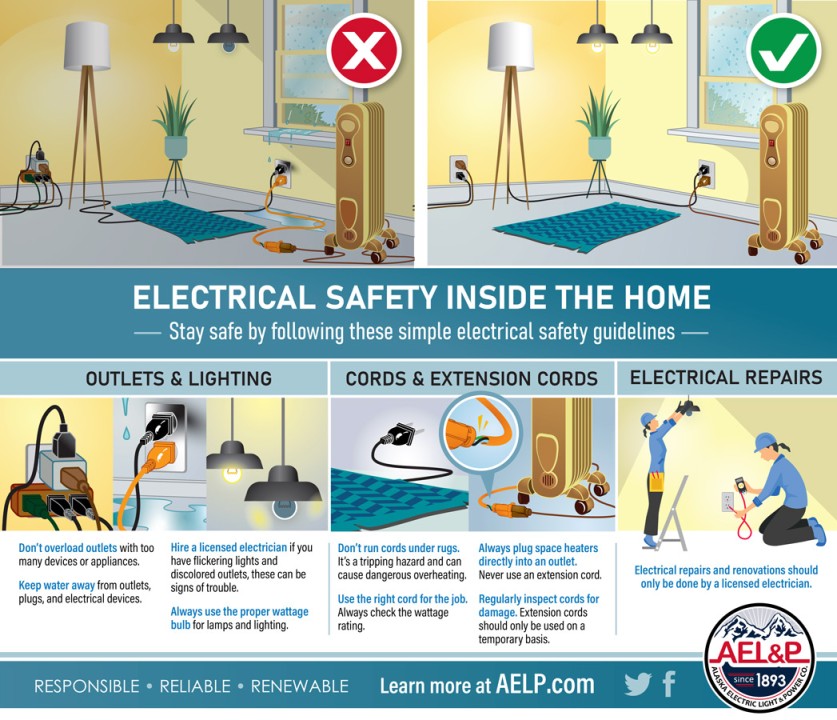Creating a Secure Haven: Essential Tips for Home Electrical Safety
Electricity is a fundamental part of modern living, powering our homes and devices. However, it demands respect and caution to ensure the safety of your household. Explore these crucial tips to guarantee electrical safety in your home, creating a secure environment for you and your loved ones.
Understanding Electrical Basics
Before implementing safety measures, it’s essential to understand some basic principles of electricity. Know the location of your circuit breaker or fuse box and how to shut off power in case of an emergency. Familiarize yourself with the different types of outlets and their voltage ratings. This foundational knowledge forms the basis for safe electrical practices.
Regular Electrical Inspections
Regular inspections of your home’s electrical system are crucial for identifying potential hazards. Look for signs of wear or damage on electrical cords, outlets, and switches. If you notice any discoloration, sparking, or burning smells, it’s a clear indication of a problem that needs immediate attention. Periodic inspections help catch issues before they escalate.
Proper Use of Extension Cords
While extension cords provide convenient temporary solutions, they should not be used as permanent wiring. Avoid overloading extension cords, and never daisy-chain multiple cords together. Make sure the cords are rated for the appliances you’re using and inspect them regularly for fraying or damage. Opt for a qualified electrician to install additional outlets where needed.
Childproofing Outlets and Cords
If you have young children in your home, childproofing outlets and cords is essential. Install tamper-resistant outlets, which have built-in safety features to prevent accidental shocks. Keep cords out of reach or use cord organizers to secure them. Educate children about the dangers of playing with electrical devices and outlets.
Safe Appliance Usage
Use appliances according to their intended purpose and follow manufacturer instructions. Unplug small appliances when not in use, and never yank the cord to disconnect them. Regularly check the condition of appliance cords and replace any that show signs of wear. Be cautious with space heaters and follow safety guidelines to prevent overheating or fire hazards.
Proper Light Bulb Wattage
Ensure you use the correct wattage for light fixtures to prevent overheating. Exceeding the recommended wattage can lead to electrical fires. Check the maximum wattage allowed for each fixture and use bulbs that comply. LED bulbs are energy-efficient and emit less heat, making them a safer choice for many applications.
Outdoor Electrical Safety
Extend your safety measures to outdoor areas. Use outdoor-rated extension cords and outlets for exterior electrical devices. Keep all electrical connections dry and protected from the elements. Install ground fault circuit interrupters (GFCIs) in outdoor outlets to prevent electric shocks in wet conditions. Regularly inspect outdoor wiring for damage.
Professional Electrical Installations
When it comes to electrical installations or major repairs, rely on professional electricians. DIY electrical work, even seemingly simple tasks, can lead to serious consequences. A licensed electrician has the expertise to ensure installations comply with safety codes and standards. From wiring upgrades to installing new outlets, professional help is invaluable.
Fire Safety Measures
Electrical fires are a significant concern in homes. Install smoke detectors on every level of your home and test them regularly. In addition, consider installing a whole-house surge protector to safeguard electronics and appliances from power surges. Develop a fire escape plan with your family and ensure everyone knows how to use fire extinguishers.
Stay Informed and Educated
Staying informed about electrical safety is an ongoing process. Stay updated on the latest safety guidelines and technologies. Attend workshops or seminars on electrical safety, and encourage your family members to do the same. The more knowledge you have, the better equipped you are to create a secure home environment.
To delve deeper into ensuring electrical safety in your home, visit Ensure Electrical Safety in Your Home. This resource provides additional insights and innovative solutions to further enhance the safety of your electrical systems. Prioritizing electrical safety is a responsibility that contributes to the well-being of your home and its occupants.

